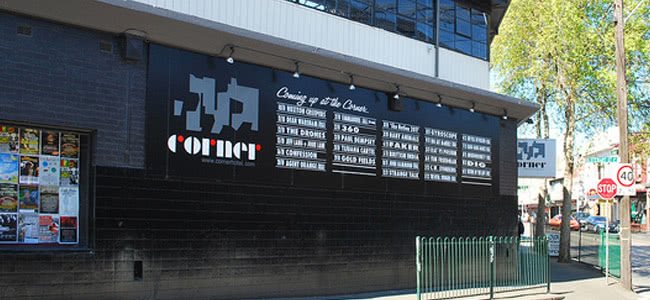With national SLAM day less than two weeks away, with musicians and lovers of live music turning out on Saturday 23rd February for over 200 gigs that support and celebrate Australia’s Live Music, there’s some poorly timed news arriving about the future of some of Australia’s most iconic venues.
Sydney’s cultural scene has suffered from the shock announcement that the iconic Annadale Hotel would be entering into receivership, while the owners, Dan and Matt Rule have met with the banks to discuss the venue’s position to ensure it continues providing live music, meanwhile local Liechhardt Mayor Darcy Byrne has thrown support behind the venue saying “we want rock and roll not residential development.”
It’s a rallying cry that would be equally befitting in Melbourne where one if its most legendary live institutions, the Corner Hotel, is under threat from new residential development.
As the Melbourne Times Weekly reports, a new 13-storey tower has been proposed for a site just across from the Richmond live music venue, with developers submitting plans for an apartment complex that will service 43 tenants, as well as a basement cafe, located at 63-65 Swan Street, currently the site of a late-night pizza parlour with just a single laneway distancing it from the Corner.
Under Victoria’s current planning laws, residential developments take precedence over live music venues – established or otherwise – when it comes to noise complaints, with venues liable for paying fines, or forced to amend their opening hours or spending thousands on sound-proofing.
It’s the very same ‘fun police’ tactics that squeezed hundreds of thousands in legal costs from the Rule brothers in their eight-year long stoush with local council after first taking over the venue in the early 2000s. “It’s (The Corner) definitely under threat and the uncertainty is one of the most worrying things.” – Patrick Donovan, Music Victoria
Music Victoria CEO Patrick Donovan, who hosted a live music forum as part of St. Kilda Festival addressing the troubled year of similar noise complaints and pressure on live music venues in the area, called the residential development proposal encroaching on the Corner “very worrying.”
Donovan stressed that laws needed to be amended quickly in order to protect established venues from noise complaints and the precedence taken by residential development. “It’s (The Corner) definitely under threat and the uncertainty is one of the most worrying things,” Donovan told the Melbourne Times Weekly.
“The demise of the Corner Hotel would be catastrophic for the live music scene – it hosts album launches, hundreds of overseas acts perform every year; there’s bands seven nights a week.”
SLAM co-founder, Helen Marcou says that the state government opened discussions between live music and industry representatives, licensees, government and Victoria Police last July, that the government is “pro-reform” on their stance.
Building code reforms and the issues of developments encroaching on live music venues were both on the agenda, according to the Melbourne Times Weekly, with submissions on planning reform going straight to Planning Minister Matthew Guy.
“Our priorities are really to look at planning reform because we’re in damage control,” Marcou says. “We’re putting out spot fires and if we don’t pre-empt this and jump on it right now we could have some major trouble down the way. We are calling for things like [Capital City Zoning] to be reviewed, particularly with the projected 30-40,000 new residents moving into the inner city in the next five years.”
A situation that could potentially see more venues under threat as more staunch residents (like Mr. Edmonds, who our editor addressed an open letter to) move into areas with established music venues.
“Our priorities are really to look at planning reform because we’re in damage control.” Helen Marcou, SLAMIt’s also a priority issue for the Federal Government’s first National Live Music Coordinator, Dr Ianto Ware. Appointed by Sounds Australia and Arts Minister Simon Crean, Dr Ware is set to use his expertise in the live music sector to consult and advise on the state of Australia’s music industry towards the government’s new National Cultural Policy.
Dr Ware says that, over the next three years, he aims to identify ways of untangling the complex web of ‘party-killing laws’ – such as noise complaints, liquor licensing woes, and environmental concerns – that are damaging live music at a local level by formalising legislation between states, as well as making it easier on live music venues to operate their businesses, to keep open and stay open.
Dr Ware’s positions and views certainly seem to be on target with the concerns of live music lovers, who are seeing some of Australia’s most iconic music venues nearly swallowed up – including the famous battle for Melbourne’s The Tote, Sydney’s Annandale Hotel entering receivership, while fellow long-running pub The Sando wasn’t so lucky, falling amidst controversy involving shifty banks and poor loan practices.
“It all starts on the local level and what we’re seeing now are small venues that have never had major issues being arbitrarily put into a high risk position due to overlapping laws,” says Dr. Ware. “The creep of legislation has resulted in lots of venues closing and has made it very difficult for others to run at a profit,” he says, encouraging dialogue between venue owners, the entertainment industry, and government agencies was key to striking a balance between concerns about public safety and cultural engagement.
More details on the residential development taking place in Richmond can be viewed at the Yarra City Councils’ website.

































